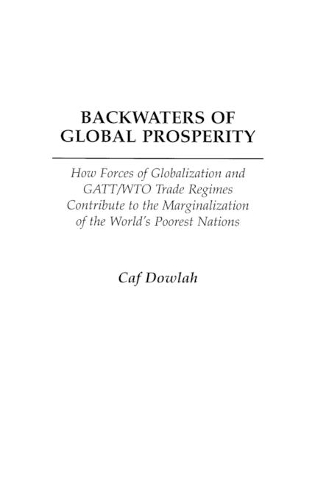
Backwaters of Global Prosperity: How Forces of Globalization and GATT/WTO Trade Regimes Contribute to the Marginalization of the World's Poorest Nations
(Hardback)
Publishing Details
Backwaters of Global Prosperity: How Forces of Globalization and GATT/WTO Trade Regimes Contribute to the Marginalization of the World's Poorest Nations
By (Author) Caf Dowlah
Bloomsbury Publishing PLC
Praeger Publishers Inc
30th November 2004
United States
Classifications
Tertiary Education
Non Fiction
Globalization
382.091724
Physical Properties
Hardback
220
Description
Marginalization of the world's poorest countries has been growing since the 1980s; this work gets to the heart of the issue by analysing all the factors involved From direct foreign investment to the flow of capital, there are endless factors that affect the economies of the world's poorest countries. Knowledge of the struggles of these countries, also known as the Least Developed Countries (LDCs), is essential to understanding the impact of globalization. This work provides a platform for understanding why developed countries are reaping the benefits of globalization while the LDCs are being left behind. Topical chapters seek to uncover the processes that LDCs should take to reverse their marginalization and build their economies so that they can receive the benefits of globalization. Subjects include: The relationship between the World Trade Organization, World Bank, and the International Monetary Fund; multilateral trade regimes; tariff and non-tariff barriers in developed countries; global commodity prices; trends in poverty and human development; technology. Analyzes why globalization is failing to work for poorer nations Discusses the role of organizations such as the World Bank and IMF in marginalizing poor countries
Reviews
"[A] thought-provoking book that provides an excellent analysis of the difficulties and dilemmas that the least developed countries (LDCS) face in the contemporary world economy. Many years of experience with GATT/WTO-related issues helped the author in making persuasive arguments about the interests, options and contraints of the LDCS for integrating their economies into rapidly globalizing world economy. This is a well-written, well-informed, and timely study providing useful material to academics, professionals and policy makers concerned with the condition of the LDCS and the contemporary trend towards economic globalization."-Rashid Faruqee Senior Policy Advisor to the Government of Pakistan
"[A] welcome treatise of the alarming problem that too many people in poor nations have been left out both from the decision making process and the benefit stream that globalization is doubtlessly generating. Many of his observations can be seen as points of departure for urgently needed corrections. Dr. Dowlah explains in excellent detail the complexities of the political economy of globalization and he draws attention to those flaws in international governance that need to be corrected if we want to ensure that the citizens of the poorest nations can also gain from the forces of these epochal changes."-Dr. Werner Kiene United Nations World Food Program Representative
"[M]akes and important, timely, and insightful contribution to the literature on the economics of globalization. Dowlah's careful scholarship leads us into consideration of the significance of transitions and transactions between developed, developing, and under developed countries--and why we need to be concerned with understanding what the term "developed" means."-Robert F. Duvall, Ph.D. President & Chief Executive Officer The National Council on Economic Education
"This volume provides an unusually good analysis of the particular elements of globalization in general and the global trade regime in particular that are biased against the interests of the world's least developed countries. Many books have been published that look at globalization from the "bottom up," but few authors present such detailed and informed analysis as does Dowlah....[t]his is a thoughtful contribution to the globalization debate and a very useful introduction to the particular trade issues affecting the least developed countries. Highly recommended. Lower-division undergraduate through faculty collections."-Choice
[W]hat really makes me recommend the book is the queries it raises ... as to what should be the real nature of global trade governance ... These are refreshing questions, which demand greater attention by all who want to make poverty history and see a fairer world emerge.-Development Policy Review
This volume provides an unusually good analysis of the particular elements of globalization in general and the global trade regime in particular that are biased against the interests of the world's least developed countries. Many books have been published that look at globalization from the "bottom up," but few authors present such detailed and informed analysis as does Dowlah....[t]his is a thoughtful contribution to the globalization debate and a very useful introduction to the particular trade issues affecting the least developed countries. Highly recommended. Lower-division undergraduate through faculty collections.-Choice
"What really makes me recommend the book is the queries it raises ... as to what should be the real nature of global trade governance ... These are refreshing questions, which demand greater attention by all who want to make poverty history and see a fairer world emerge."-Development Policy Review
"[W]hat really makes me recommend the book is the queries it raises ... as to what should be the real nature of global trade governance ... These are refreshing questions, which demand greater attention by all who want to make poverty history and see a fairer world emerge."-Development Policy Review
Author Bio
CAF DOWLAH is Professor of Economics, and Director of the Center of Economics Education at the CUNY-Queensborough College.
